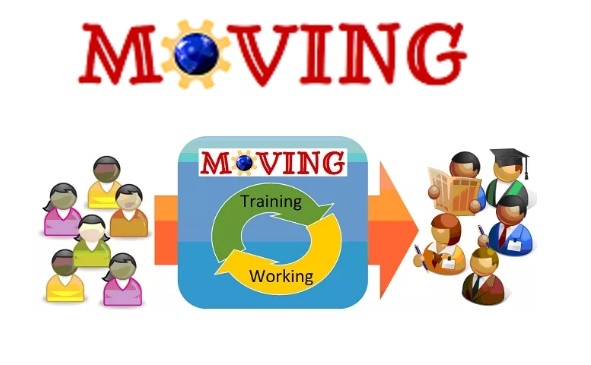EU Project MOVING : TraininG towards a society of data-saVvy inforMation prOfessionals
28/06/2017


MOVING (TraininG towards a society of data-saVvy inforMation prOfessionals to enable open leadership INnovation) is a Research and Innovation Action (2016 - 2019) that has received funding from the European Union’s Horizon 2020 research and innovation programme. MOVING's goal is to build a TRAINING PLATFORM that will enable users from all societal sectors to fundamentally improve their information literacy by training how choose, use and evaluate data mining methods in connection with their daily research tasks and to become data-savvy information professionals.
________________________________________________________________________________________________________________
Considering that information and data management is one of the basic competencies today, the MOVING project therefore takes one important step towards a society of data-savvy information professionals to help ensure that open leadership innovation happens. To reach this objective, the project will develop the open, innovation training platform “MOVING” that is both:
1. A WORKING environment for the quality and usability analysis of large text collections and free online contents with data mining methods equally open for people from science, public administration and business, and
2. A TRAINING environment (with formal and informal learning options) with information, training and exchange offers in the broad field of digital information management. It is exactly that connection of technical application and curriculum that will make the platform a holistic and thus long-term successful service.
The MOVIING platform will thus provide users with technical support as well as social advice and learning functionalities in order to help them organise, filter and exploit information in a more efficient and sustainable way.
|
This Deliverable presents the Data Management Plan of the MOVING project: In particular, it describes in detail the adopted management policy for the datasets that will be collected, processed or generated by the project. The utilized approach: (a) identifies which data and how they will be exploited or made publicly accessible so as to maximize their reuse potential, (b) specifies how these data will be curated and preserved, to support their reuse, and (c) identifies any data that should not be made publicly available and measures to be taken for their safe-keeping. |
You might also be interested in the two use cases of the MOVING project:
1. Research on business information by public administrators
"... to generate knowledge from the data at the desired level of detail, e.g. without a need to go into too much detail. However, at any stage, the user is able to access the content if needed. Further, measures are implemented, enabling the user to access the completeness of a research. For example, by using measures of centrality of a topic, the user may assess the most important aspects of a topic..."
2. Managing and mining research information
"The discrepancy between the theoretically offered wealth of information and the practical possibilities of their exploitation within the everyday academic work is thereby perceived as more painful and successful research today is more than ever before demanding a comprehensive respectively international perspective. Therefore, the automated analysis of large literature corpora in a specific field of research is of great interest for scientist of every discipline..."
Currently MOVING organises:
# An event at the 2nd OER World Congress (18-20th September 2017).
The 2nd World OER Congress will follow the theme “OER for Inclusive and Equitable Quality Education: From Commitment to Action”, reflecting a strong focus on the role of OER in achieving Sustainable Development Goal 4.
# The 1st International Workshop on Educational and Knowledge Technologies (MultiEdTech2017) at the ACM Multimedia Conference that will take place on October 23 – 27, 2017 at Mountain View, CA, USA.
The tentative date for paper submission is 19 July 2017.
This one-day event will be classified as a scientific event, where scientific/educational content is presented and it’s connecting theme is “Users’ capacity to access, reuse and share OER”.
- Learn more about the MOVING Project from its website
- List of MOVING publications (published on ZENODO)
________________________________________________________________________________________________________________
Related content:
- The European Commission launched Open Education Europa to ensure that anyone from across the EU can find, discuss and learn how to bring innovation to the world of education.
- On 29 June 2017 (from 1:00PM to 2:00PM CEST) Open Education Europa is inviting you to join an online discussion on e-Portfolios
- Digital Resources, Open Educational Resources – Accessing and Evaluating
- The Horizon 2020 project PROSO aims to foster the engagement of third sector organizations (like NGOs) and citizens for Responsible Research and Innovation (RRI). The three areas are nanotechnology, food and health, and bio-economy. [Five keys of RRI: Engagement - Science education - Open access - Ethics - Gender]
- RRI Tools: fostering Responsible Research and Innovation
- Open Educational Resources: the future of Education, co-created with You
